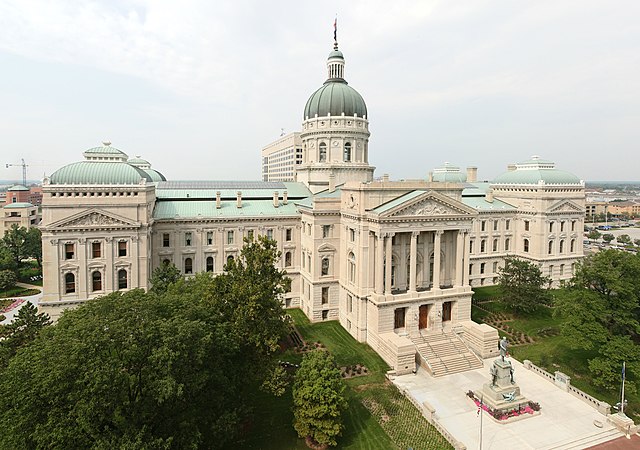Thomas Riley Marshall was an American politician who served as the 28th vice president of the United States from 1913 to 1921 under President Woodrow Wilson. A prominent lawyer in Indiana, he became an active and well known member of the Democratic Party by stumping across the state for other candidates and organizing party rallies that later helped him win election as the 27th governor of Indiana. In office, he attempted to implement changes from his progressive agenda to the Constitution of Indiana, but his efforts proved controversial and were blocked by the Indiana Supreme Court.
Marshall, c. 1910s
The Thomas R. Marshall House at Columbia City was listed on the National Register of Historic Places in 1983.
Marshall c. 1912
The Indiana Statehouse in Indianapolis
Vice President of the United States
The vice president of the United States (VPOTUS) is the second-highest officer in the executive branch of the U.S. federal government, after the president of the United States, and ranks first in the presidential line of succession. The vice president is also an officer in the legislative branch, as the president of the Senate. In this capacity, the vice president is empowered to preside over the United States Senate, but may not vote except to cast a tie-breaking vote. The vice president is indirectly elected together with the president to a four-year term of office by the people of the United States through the Electoral College. Since the passage of the Twenty-fifth Amendment to the US Constitution, the vice president may also be appointed by the president to fill a vacancy, via majority confirmation by both the Senate and the House.
Vice President of the United States
John Adams, the first vice president of the United States
Though prominent as a Missouri Senator, Harry Truman had been vice president only three months when he became president; he was never informed of Franklin Roosevelt's war or postwar policies while serving as vice president.
1888 illustration of John Tyler receiving the news of President William Henry Harrison's death from Chief Clerk of the State Department Fletcher Webster








